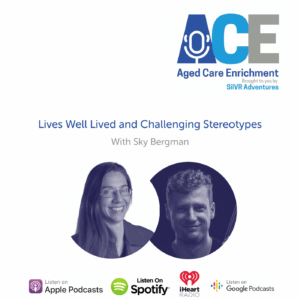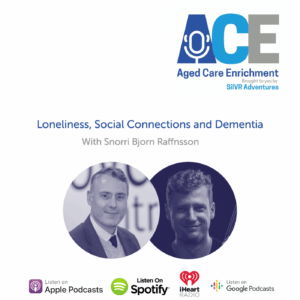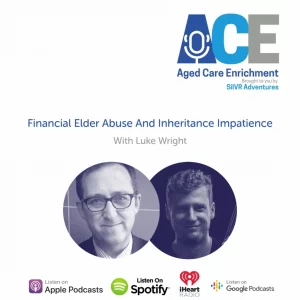Carl Honore’s Book
Today’s episode is about something that we all experience, and we all contribute to despite our best efforts. Ageism and ageist beliefs are all around us, and we’ve got author Carl Honoré joining us to talk about finding ways to overcome ageism in our daily work.
Working with vulnerable older adults, it can sometimes be difficult to see these individuals as people who are living full and rich lives just like ourselves. Carl’s newest book Bolder – Making the Most of Our Longer Lives, has practical ways of helping us break down some of the not so helpful ideas often ingrained about growing older, and changing the way we perceive the ageing process.
You can order Carl’s book Bolder – Making the Most of Our Longer Lives here
Snippet
"As you grow older, you come to know yourself and get more at ease with your own skin and your place in the world. You tend to feel less beholden to other people's expectations and opinions."
-Carl Honore'
The Stigma Of Ageing
A lot of the talk around ageing comes from our own perceptions of it. Naturally if we have a grim and depressing idea of ageing, we tend to age less well. You’re more likely to suffer the physical and cognitive decline of ageing even more so than the average person. It is true that being in every age group has its pros and cons. But one of the challenges with ageing is that the cons tend to be more visible as our physical changes become so obvious. It’s evident in the way we look, the way we move and the way our body responds to everyday stimuli makes a difference. So naturally, as a younger person looking ahead at the idea of ageing, what jumps at them is mostly the downside. We don’t see the benefits as they’re hidden beyond the wrinkles and grey hair. The positive side of ageing is untold as often times, it’s invisible.
The Associated Fear
The phrase “anti-ageing” that’s plastered on millions of products and services globally just reinforces the idea that ageing is all about loss, decline, depression, dementia and technical incompetence. The culture around this just perpetuates the idea that it’s game over after 35. The unfortunate stereotype associated with ageing tends to be depressing as people who are older tend to be associated with adjectives like cranky, sad or grumpy which is completely untrue.
The Unseen Upside
We can follow what’s called a ‘U-shaped happiness curve’ which basically means we start very high in our childhood, we fall steadily until our middle ages and then we bounce back up again. This is why in a lot of the countries around the world, the adult group that reports the highest level of satisfaction and happiness are the ones above the age of 50. These U-shaped stages are also known to be observed in chimpanzees, baboons and orangutans. These findings by scientists could suggest that happiness boosts much later in life and it is coded in our primary genes.
The other upside is creativity. Although humans can be creative at any stage in life, there are some forms of creativity which you can only get from ageing due to time and experience. Historically, we do see people doing triumphantly creative work much later in life from Michaelangelo to Beethoven to Maya Angelou. Going further, productivity tends to rise in jobs that rely on social acumen which is common in the older population. Ageing should be seen as a journey where you’re opening new doors rather than closing them. When you use this perspective, the idea becomes a lot less frightening.
What Can We Do?
In the environment of working in a residential aged care home, it would be beneficial to expose ourselves to more happier narratives and redefine the stigma around ageing. In order for change to happen, we need to get out there and lean on our political representatives to pass new laws against ageism so it would be seen in the same light as racism and sexism. It’s very important to cultivate the language we use to put down ageing as a lot of our perceptions are shaped by this. The change starts with us today.






